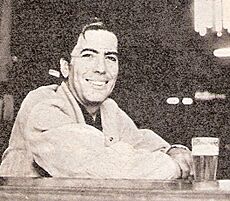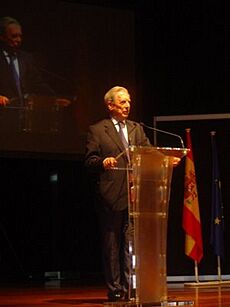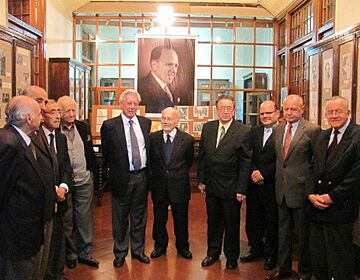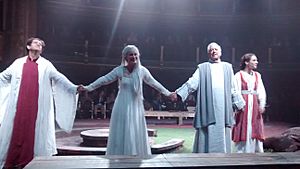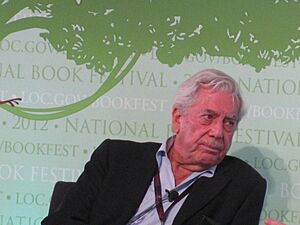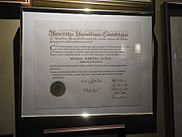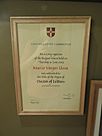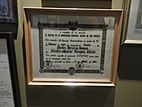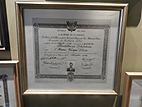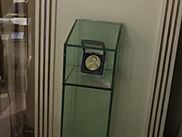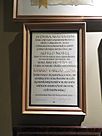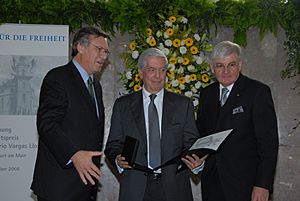Mario Vargas Llosa facts for kids
Quick facts for kids
The Most Illustrious
The Marquess of Vargas Llosa
OSP OCC
|
|
|---|---|
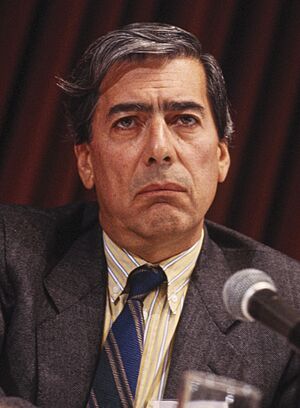
Vargas Llosa in 1986
|
|
| Born |
Jorge Mario Pedro Vargas Llosa
28 March 1936 Arequipa, Peru
|
| Died | 13 April 2025 (aged 89) Lima, Peru
|
| Citizenship |
|
| Alma mater | |
| Title | Marquess of Vargas Llosa (from 2011) |
| Political party | People's Liberty (from 2023) |
| Spouse(s) |
Julia Urquidi
(m. 1955; div. 1964)Patricia Llosa
(m. 1965; separated 2015) |
| Partner(s) | Isabel Preysler (2015–2022) |
| Children | 3, including Álvaro |
| Writing career | |
| Literary movement | Latin American Boom |
| Notable works |
|
| Notable awards | Nobel Prize in Literature 2010 |
| Signature | |
Jorge Mario Pedro Vargas Llosa, 1st Marquess of Vargas Llosa (born 28 March 1936 – died 13 April 2025) was a famous writer and politician from Peru. He was known for his novels, journalism, and essays. Many people consider him one of the most important Latin American writers of his time.
Vargas Llosa became famous around the world in the 1960s. He wrote popular novels like The Time of the Hero (1963), The Green House (1965), and Conversation in The Cathedral (1969). He wrote many different types of books, including comedies, mystery stories, historical novels, and political thrillers. In 2010, he won the Nobel Prize in Literature. This award was given to him for his powerful writing about how power works and how individuals fight against it.
Many of his stories were made into movies, such as Captain Pantoja and the Special Service and Aunt Julia and the Scriptwriter. His experiences growing up in Peru influenced many of his works. He also wrote essays where he spoke out against nationalism in different parts of the world.
Like many writers from Latin America, Vargas Llosa was active in politics. He first supported the Cuban government but later disagreed with their ideas. He then became a liberal and had ideas against left-wing politics. In 1990, he ran for president of Peru but did not win. In 2011, the King of Spain made him a Marquess, which is a special title of nobility.
Contents
Early Life and Family
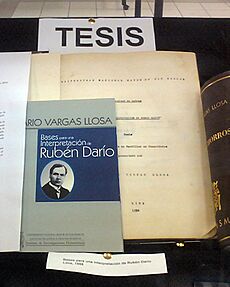
Mario Vargas Llosa was born on 28 March 1936, in Arequipa, a city in southern Peru. His parents, Ernesto Vargas Maldonado and Dora Llosa Ureta, separated before he was born. He was their only child. Later, his father had two more sons, Enrique and Ernesto, with another woman.
Mario lived with his mother's family in Arequipa. When he was about one year old, his grandfather became an honorary consul for Peru in Bolivia. So, Mario moved with his mother and her family to Cochabamba, Bolivia. He spent his early childhood there. His family told him that his father had died because they didn't want to explain the separation.
Later, his grandfather got a job in Piura, a city in northern Peru, and the family moved back. Mario went to elementary school at a religious academy there. In 1946, when he was ten, he moved to Lima and met his father for the first time. His parents got back together for a while and lived in a Lima suburb. Mario attended a Catholic middle school in Lima.
When Mario was fourteen, his father sent him to a military school in Lima. At 16, he started working as a journalist for local newspapers. He left the military school and finished his studies in Piura. There, he worked for a newspaper called La Industria and saw his first play, La huida del Inca, performed.
In 1953, Vargas Llosa went to the National University of San Marcos in Lima to study law and literature. He joined a group that believed in communism because he saw a lot of unfairness in Latin America. In 1955, at age 19, he married Julia Urquidi, who was 10 years older than him. He started his writing career in 1957, publishing his first short stories. After graduating in 1958, he received a scholarship to study in Spain.
In 1960, Vargas Llosa moved to France, thinking he would get another scholarship. When that didn't happen, he and Julia decided to stay in Paris. He began to write a lot, even writing for others. Their marriage ended in 1964. A year later, he married his first cousin, Patricia Llosa. They had three children: Álvaro (born 1966), Gonzalo (born 1967), and Morgana (born 1974).
Writing Career
First Major Books
Vargas Llosa's first novel, The Time of the Hero, came out in 1963. The book is about students at a military school in Lima. It was based on his own experiences at the Leoncio Prado Military Academy. This book became very popular right away. Critics liked his strong writing and new techniques. However, it caused some arguments in Peru because it criticized the military. Some generals said it was written by a "degenerate mind."
In 1965, he published his second novel, The Green House. This book is about a special house and how it affects the lives of the people around it. The story follows a girl named Bonifacia and how she changes. This novel was praised immediately and showed that Vargas Llosa was an important writer. It won a major award, the Rómulo Gallegos Prize, in 1967. Many critics still think The Green House is one of his best works.
His third novel, Conversation in The Cathedral, was published in 1969. This long story is about Santiago Zavala, whose father was a government minister, and Ambrosio, his driver. They meet by chance and have a long talk. Santiago tries to find out the truth about his father's past. The book shows how a dictatorship can control and ruin people's lives. It is considered one of Vargas Llosa's more serious novels.
From 1969 to 1970, Vargas Llosa taught about Spanish American Literature in London.
1970s and New Styles
In 1971, Vargas Llosa published a book about his friend, the Nobel Prize winner Gabriel García Márquez. Even though they were friends then, they later had a public disagreement in 1976. They never spoke to each other again after that.
After his serious novel Conversation in The Cathedral, Vargas Llosa's writing style changed. He started to use more humor. His first funny novel was Captain Pantoja and the Special Service, published in 1973. This short, funny book is about the Peruvian army and a special service created for soldiers in remote jungle areas. Vargas Llosa got the idea for this book after seeing something similar happen in real life.
From 1974 to 1987, Vargas Llosa focused on writing but also did other things. In 1975, he helped direct a movie based on his novel, Captain Pantoja and the Secret Service, but it wasn't very successful. In 1976, he became the President of PEN International, a group for writers and human rights. He traveled often to speak at different universities.
In 1977, he became a member of the Peruvian Academy of Language. That year, he also published Aunt Julia and the Scriptwriter. This book was partly based on his first marriage to Julia Urquidi. She later wrote her own book about their relationship. Aunt Julia and the Scriptwriter is known for using popular culture in literature. A Hollywood movie was made from the novel in 1990.
Later Novels
Vargas Llosa's fourth major novel, The War of the End of the World, came out in 1981. This was his first historical novel. It was a big change in his writing style. The book is about a real event in 19th-century Brazil where a group of people fought against the national army. This novel is serious and dark. It explores how people can be drawn to violence and fanaticism. Critics say this is one of his greatest books. Even though it was about Brazil, it was first not well-received there because a foreigner wrote about their history.
After this, Vargas Llosa started writing shorter novels. In 1983, he finished The Real Life of Alejandro Mayta. This novel is about a leftist uprising in the Andes mountains. Later that year, the President of Peru asked Vargas Llosa to join a group investigating the killing of eight journalists. This experience influenced his later writing. In 1986, he wrote Who Killed Palomino Molero?, a mystery novel. This book was a way for him to deal with his experiences from the investigation. The experience also inspired his novel Death in the Andes, published in 1993.
It was almost 20 years before Vargas Llosa wrote another major work. The Feast of the Goat, a political thriller, was published in 2000. This book is about the dictatorship of Rafael Trujillo, who ruled the Dominican Republic for many years. The novel tells the story from three different viewpoints: a woman returning to the Dominican Republic, the people who planned Trujillo's assassination, and Trujillo himself. The book was very popular and is considered one of his best.
In 2003, he wrote The Way to Paradise, which explores the lives of Flora Tristan and Paul Gauguin. In 2006, Vargas Llosa wrote The Bad Girl, a story about a man's long obsession with a woman he met as a teenager. In 2019, he published Harsh Times, about a historical event in Guatemala in 1954. In 2023, Vargas Llosa announced that he would publish his final novel, Le dedico mi silencio, and then retire from writing novels.
Political Career
Shift to Liberalism
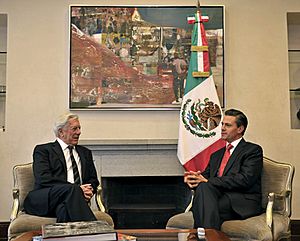
Like many other thinkers in Latin America, Vargas Llosa first supported the Cuban government led by Fidel Castro. He studied Marxism deeply in college and was drawn to communist ideas after the Cuban Revolution. However, he slowly began to believe that socialism did not fit with the freedoms he valued. His break with the Cuban government happened in 1971 when a poet was imprisoned. Vargas Llosa and other intellectuals wrote to Castro to protest. After this, Vargas Llosa became a liberal and opposed extreme left-wing ideas. He spoke out against both left-wing and right-wing governments that were authoritarian.
Investigatory Commission
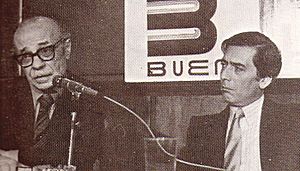
In 1983, Vargas Llosa was asked to join a group investigating a massacre in a village called Uchuraccay. This was a difficult time in his political life. The Peruvian news criticized him, suggesting the massacre was a government cover-up. The commission concluded that the local villagers were responsible for the killings. Vargas Llosa said this event showed how fragile democracy is in Latin America. However, his conclusions were heavily criticized by some who said he didn't understand the local culture. Vargas Llosa responded that his critics seemed more concerned with his report than with the many people who later died in the conflict.
Presidential Candidacy
In 1987, he helped start a center-right political party. The next year, his party joined with other conservative parties to form a group called Frente Democrático (FREDEMO). He ran for president of Peru in 1990 with the support of the United States. He suggested economic changes that included privatization and free markets. Many poor people in the country were worried about these plans.
Vargas Llosa won the first round of the election with 34% of the votes. However, he lost in the next round to Alberto Fujimori, who was not well-known at the time. Vargas Llosa wrote about his experience running for president in his memoir, A Fish in the Water (1993).
Later Life
From the 1990s onwards, Vargas Llosa mostly lived in Madrid, Spain. However, he spent about three months each year in Peru with his family. He also often visited London. In 1993, he became a Spanish citizen, but he kept his Peruvian citizenship too. He often said he loved both countries. In his Nobel Prize speech, he said he carried Peru deep inside him because it's where he grew up. He also said he loved Spain as much as Peru and owed a lot to it. In 2023, he also accepted Dominican nationality.
Mario Vargas Llosa taught at Harvard University in 1992–1993. Harvard later gave him an honorary degree in 1999. In 1994, he was chosen to be a member of the Real Academia Española (Royal Spanish Academy), which is a very important group for the Spanish language.
Financial Reports
Vargas Llosa was mentioned in financial reports like the Panama Papers (2016) and Pandora Papers (2021). These reports linked him to companies in the British Virgin Islands. His representatives stated that any investments were made without his full knowledge or consent. However, a document from the 2021 leak showed his signature on a form for one of these companies.
Style of Writing
Plot, Setting, and Themes
Vargas Llosa's writing often combines historical events with his own experiences. For example, in The Time of the Hero, his time at military school helped him show the problems within that institution. The problems in the school also reflected problems in Peruvian society at the time. Vargas Llosa often used his writing to highlight issues in society, like unfairness and oppression. A main theme in his work is how individuals fight for freedom when they are controlled by powerful people. For instance, Conversation in The Cathedral is about the harsh rule of President Manuel A. Odría. The main character, Santiago, tries to fight against the dictatorship.
Many of Vargas Llosa's early novels were set in Peru. Later, he wrote about other parts of Latin America, like Brazil and the Dominican Republic. His travels for work and lectures gave him ideas for settings outside Peru. The War of the End of the World was his first major book set outside Peru. It's based on a historical revolt in Brazil, but it's not a history book; he took many creative liberties. The Feast of the Goat, set in the Dominican Republic, is about the dictatorship of Rafael Trujillo. Vargas Llosa studied Dominican history to prepare for this novel.
Modern and Postmodern Styles
Mario Vargas Llosa's books are seen as both modernist and postmodernist. Modernist novels are often complex and serious, like his early works The Green House and Conversation in The Cathedral. Postmodernist novels, however, can be lighter and more humorous. His later novels, such as Captain Pantoja and the Special Service and Aunt Julia and the Scriptwriter, show this change with their funny and playful tone. For example, both The Green House and Captain Pantoja and the Special Service deal with similar themes, but The Green House is very serious, while Captain Pantoja is very funny.
Interlacing Dialogues
Vargas Llosa often used a special technique called "interlacing dialogues." This means he would combine two conversations that happened at different times or in different places. This creates the feeling of a flashback or a shift in location. He started using this technique in his first novel, The Time of the Hero. In The Green House, he used it to connect important events. In Captain Pantoja and the Special Service, he used it for funny effects.
Literary Influences
Vargas Llosa was first influenced by Peruvian writers who were trying new ways of writing. He wanted a style that was different from the traditional stories about rural life. He admired the Peruvian novelist José María Arguedas, even though their styles were different.
He also looked to writers from other countries for ideas. Two French writers, Jean-Paul Sartre and Gustave Flaubert, influenced his writing. Sartre's influence can be seen in Vargas Llosa's use of conversations. Flaubert's independent artistic style also inspired him. Vargas Llosa wrote a book about Flaubert's ideas on art.
One of Vargas Llosa's favorite writers was the American author William Faulkner. Vargas Llosa believed Faulkner had perfected modern novel writing. Both writers used complex changes in time and narration in their stories. For example, parts of The Time of the Hero were influenced by Faulkner's novel Light in August.
Vargas Llosa also wrote literary criticisms about other authors he admired, like Gabriel García Márquez and Albert Camus. In these non-fiction works, he often talked about how these authors influenced his own writing.
Political Views
After moving away from left-wing politics, Vargas Llosa became a supporter of right-wing politics. He described himself as a liberal. He said that thinkers like Karl Popper and Friedrich Hayek greatly influenced his political ideas. He was also a member of the Information and Democracy Commission, a group that supports freedom of the press. In 2023, he supported a right-wing candidate in Argentina.
Chile
In 1999, after a former Chilean leader was arrested, Vargas Llosa wrote an article asking why left-wing dictators were not also arrested. In the 2021 Chilean election, he supported a conservative presidential candidate.
Brazil
During the 2022 Brazilian election, Vargas Llosa supported Brazilian president Jair Bolsonaro. He said that even with some of Bolsonaro's controversial statements, he preferred him over the other main candidate.
Mexico
In 1990, after losing the Peruvian election, Vargas Llosa attended a conference in Mexico. He surprised his hosts by criticizing the Mexican government, which had been in power for 61 years. He called Mexico "the perfect dictatorship" because it was a hidden dictatorship. This statement became very famous.
Peru
In the 2011 Peruvian election, Vargas Llosa said he would vote for Alejandro Toledo. He believed Peru should stay on the path of law and freedom.
He had mixed feelings about conservative politician Keiko Fujimori, daughter of former president Alberto Fujimori. In 2011, he said voting for Keiko would mean supporting a bad dictatorship. He even encouraged people to vote for a left-wing candidate instead. However, in the 2021 election, he supported Keiko Fujimori, seeing her as the "lesser of two evils" compared to another candidate.
Spain
In 2008, he stopped supporting a certain political party in Spain and instead supported a newer party. He felt that some of the older party's views didn't match his liberal beliefs. He continued to write and travel a lot.
Vargas Llosa was against the idea of Catalonia becoming independent from Spain. In 2017, he attended a rally in Barcelona against independence. He said that Spanish democracy would last and no group could destroy it.
Later Personal Life
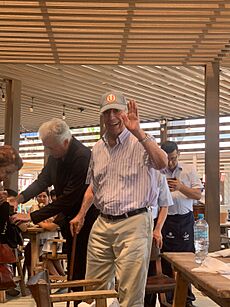
Vargas Llosa said he was an agnostic, meaning he wasn't sure if God existed. He loved music, especially the composer Gustav Mahler. He also enjoyed soccer and was a big fan of the Peruvian team Universitario de Deportes. In 2011, he was made an honorary member of this soccer club.
In 2015, Vargas Llosa started a relationship with Isabel Preysler and separated from his second wife, Patricia Llosa. In December 2022, it was announced that Vargas Llosa and Preysler had ended their relationship.
In April 2022, he was hospitalized after getting COVID-19.
Death
Vargas Llosa passed away in Lima, Peru, on 13 April 2025, at the age of 89. His son, Álvaro Vargas Llosa, shared that his father was surrounded by family and "at peace." His remains were cremated in a private ceremony.
Leaders from many countries, including Mexico, Peru, Chile, Uruguay, Colombia, France, Spain, and Germany, honored Vargas Llosa's work and legacy.
The Peruvian government declared 14 April 2025 a day of national mourning. Flags were flown at half-mast on public buildings to recognize the writer. In Spain, the city of Marbella, where he often lived, declared two days of official mourning.
The Community of Madrid announced that it would give Vargas Llosa a special award after his death.
Impact
Vargas Llosa is considered a very important Latin American writer, alongside other famous authors like Gabriel García Márquez and Isabel Allende. His work had a big positive influence on Latin American literature.
Most of Vargas Llosa's stories have been translated into many languages, showing his success around the world. He also made important contributions to journalism, which is something not many other Latin American writers have done. He is known for promoting literature, especially novels, as a way to comment on life. Throughout his career, he wrote many novels and other books, and he was a leading voice for Latin American literature for decades.
Several of Vargas Llosa's books have been made into movies. For example, The Time of the Hero became the film The City and the Dogs in 1985. Captain Pantoja and the Special Services was also made into a film in 1999. His cousin directed a film version of The Feast of the Goat in 2005. Aunt Julia and the Scriptwriter was made into an English-language film in 1990. The Feast of the Goat has also been adapted into a play.
After his death, newspapers around the world called Vargas Llosa a "giant of Latin American literature." They noted that his impact went far beyond his home country. He was described as a writer who explored themes like unfair rule, corruption, and extreme beliefs in Latin America.
Awards and Honours
Vargas Llosa won many awards for his writing. These include the 1962 Premio Biblioteca Breve for The Time of the Hero and the 1993 Premio Planeta for Death in the Andes. The literary critic Harold Bloom included his novel The War of the End of the World in his list of important literary works.
A very important award he received was the 1994 Miguel de Cervantes Prize. This is considered the most important award in Spanish-language literature. In 2002, he received the PEN/Nabokov Award.
On 7 October 2010, the Swedish Academy announced that Vargas Llosa had won the 2010 Nobel Prize in Literature. He received it for his "cartography of structures of power and his trenchant images of the individual's resistance, revolt, and defeat." People around the world were very happy about this decision.
On 4 February 2011, King Juan Carlos I of Spain gave Vargas Llosa the special title of Marqués de Vargas Llosa (Marquess of Vargas Llosa). In 2021, he was also elected to the Académie française, a prestigious French academy.
Honours
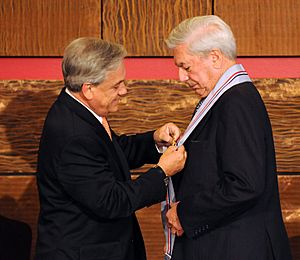
- Chile
-
- First Class of the Gabriela Mistral Order of Educational and Cultural Merit
- Pablo Neruda Order of Artistic and Cultural Merit (2018)
- Dominican Republic
-
- Grand Cross with Silver Star of the Order of Christopher Columbus
- France
-
- Chevalier of the Legion of Honour
- Commander of the Ordre des Arts et des Lettres
- Mexico
-
- Commander (Placa) of the Order of the Aztec Eagle
- Nicaragua
-
- Grand Cross with Silver Star of the Order of Rubén Darío
- Peru
-
- Member of the Peruvian Academy of Language
- Grand Cross with Diamonds of the Order of the Sun of Peru
- 2011 – Grand Cross of the Medal of Honour of the National University of San Marcos, his university.
- Panama
-
- Grand Cross of the Order of Vasco Núñez de Balboa
- Philippines
-
- Honorary Professor, bestowed by the University of Santo Tomas, Manila
- Spain
-
- Hereditary Marquessate of Vargas Llosa, given by King Juan Carlos I of Spain
- Member of the Royal Spanish Academy
- Gold Medal of the Community of Madrid
- Romania
-
- Doctor Honoris Causa, given by the Babeș-Bolyai University of Cluj-Napoca, Romania, in 2013
Awards
- Rómulo Gallegos Prize (Venezuela, 1967)
- Prince of Asturias Award for Literature (Spain, 1986)
- Max Schmidheiny Freedom Prize (Switzerland, 1988)
- Miguel de Cervantes Prize (Spain, 1994)
- Nobel Prize in Literature (Sweden, 2010)
- St. Louis Literary Award from the Saint Louis University Library Associates (United States, 2011)
- Carlos Fuentes International Prize for Literary Creation in the Spanish Language (Mexico, 2012)
- Pedro Henríquez Ureña International Prize (Dominican Republic, 2016)
Invited Commencement Addresses
- 1992 – Boston University
Selected Works
Fiction
- 1963 – La ciudad y los perros (The Time of the Hero, 1966)
- 1966 – La casa verde (The Green House, 1968)
- 1969 – Conversación en La Catedral (Conversation in The Cathedral, 1975)
- 1973 – Pantaleón y las visitadoras (Captain Pantoja and the Special Service, 1978)
- 1977 – La tía Julia y el escribidor (Aunt Julia and the Scriptwriter, 1982)
- 1981 – La guerra del fin del mundo (The War of the End of the World, 1985)
- 1984 – Historia de Mayta (The Real Life of Alejandro Mayta, 1986)
- 1986 – ¿Quién mató a Palomino Molero? (Who Killed Palomino Molero?, 1987)
- 1987 – El hablador (The Storyteller, 1989)
- 1988 – Elogio de la madrastra (In Praise of the Stepmother, 1990)
- 1993 – Lituma en los Andes (Death in the Andes, 1996)
- 1997 – Los cuadernos de don Rigoberto (The Notebooks of Don Rigoberto, 1998)
- 2000 – La fiesta del chivo (The Feast of the Goat, 2001)
- 2003 – El paraíso en la otra esquina (The Way to Paradise, 2003)
- 2006 – Travesuras de la niña mala (The Bad Girl, 2007)
- 2010 – El sueño del celta (The Dream of the Celt, 2012)
- 2013 – El héroe discreto (The Discreet Hero, 2015)
- 2016 – Cinco esquinas (The Neighborhood, 2018)
- 2019 – Tiempos Recios (Harsh Times, 2021)
- 2023 – Le dedico mi silencio
Non-fiction
- 1958 – Bases para una interpretación de Rubén Darío (Foundations for an Interpretation of Rubén Darío)
- 1971 – García Márquez: historia de un deicidio (García Márquez: Story of a Deicide)
- 1978 – La utopía arcaica: José María Arguedas y las ficciones del indigenismo (Archaic utopia: José María Arguedas and the fictions of indigenismo)
- 1990 – La verdad de las mentiras: ensayos sobre la novela moderna (A Writer's Reality)
- 1993 – El pez en el agua. Memorias (A Fish in the Water)
- 1997 – Cartas a un joven novelista (Letters to a Young Novelist)
- 2000 – Nationalismus als neue Bedrohung (Nationalism as a new threat)
- 2001 – El lenguaje de la pasión (The Language of Passion)
- 2004 – La tentación de lo imposible (The Temptation of the Impossible)
- 2007 – Touchstones: Essays on Literature, Art, and Politics
- 2008 – Wellsprings
- 2009 – El viaje a la ficción: El mundo de Juan Carlos Onetti
- 2009 – Sables y utopías: Visiones de América Latina
- 2011 – In Praise of Reading and Fiction: The Nobel Lecture
- 2012 – La civilización del espectáculo
- 2015 – Notes on the Death of Culture
- 2018 – La llamada de la tribu
- 2022 – La mirada quieta
Drama
- 1952 – La huida del inca
- 1981 – La señorita de Tacna
- 1983 – Kathie y el hipopótamo
- 1986 – La Chunga
- 1993 – El loco de los balcones
- 1996 – Ojos bonitos, cuadros feos
- 2007 – Odiseo y Penélope
- 2008 – Al pie del Támesis
- 2010 – Las mil y una noches
Vargas Llosa's essays and journalism have been collected in books like Contra viento y marea.
See also
 In Spanish: Mario Vargas Llosa para niños
In Spanish: Mario Vargas Llosa para niños
 | Kyle Baker |
 | Joseph Yoakum |
 | Laura Wheeler Waring |
 | Henry Ossawa Tanner |


